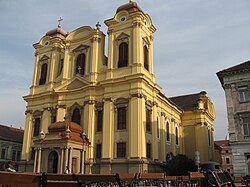St. George Cathedral, Timișoara
| The Cathedral of Saint George | |
|---|---|
 The Catholic Cathedral | |
| 45°45′29″N 21°13′49″E / 45.75813°N 21.23029°E | |
| Location | Timișoara |
| Country | Romania |
| Denomination | Roman Catholic |
| History | |
| Status | Active |
| Founded | August 6, 1736 |
| Architecture | |
| Functional status | Cathedral |
| Architect(s) | Joseph Emanuel Fischer von Erlach |
| Architectural type | Church |
| Style | Baroque |
| Completed | 1774 |
| Specifications | |
| Length | 55 m (180 ft 5 in) |
| Width | 22 m (72 ft 2 in) |
| Height | 35.50 m (116 ft 6 in) |
| Number of spires | 2 |
| Administration | |
| Diocese | Roman Catholic Diocese of Timişoara |
| Clergy | |
| Bishop(s) | Martin Roos |
The St. George's Cathedral, Timișoara or The Dome is located in Timișoara, Romania, at Piața Unirii, in the centre of town.
It is one of the most valuable buildings of Baroque architecture in Timișoara and the Banat. The interior is luxurious and expressive, with Rococo elements created by painters and sculptors of Vienna. The acoustic is great, many organs concerts being organized here.
History
The cathedral's foundation stone was laid on 6 August 1736. It was designed by Joseph Emanuel Fischer von Erlach from Vienna, then Hans Lechner continued the building from 1750. It was finished by two architects from Timișoara, Johann Theodor Kostka and Carl Alexander Steinlein in 1774. The cathedral was built in Austrian baroque style and it was dedicated to Saint George, the diocese's Patron Saint. The picture located at the high altar was painted by Michelangelo Unterberger, director of the fine arts academy of Vienna, illustrating the Patron Saint. The side altars were painted by Johann Nepomuk Schöpf in 1772.[1] The precious oil-lamps were produced by Josef Moser. The organ was made by Leopold Wegenstein, and it provides an impressive experience for the ears. The cathedral's bells were renewed in Germany in 1998.
References
- ^ Gyula Delesega. Temesvári Kalauz. Editura Marineasa


